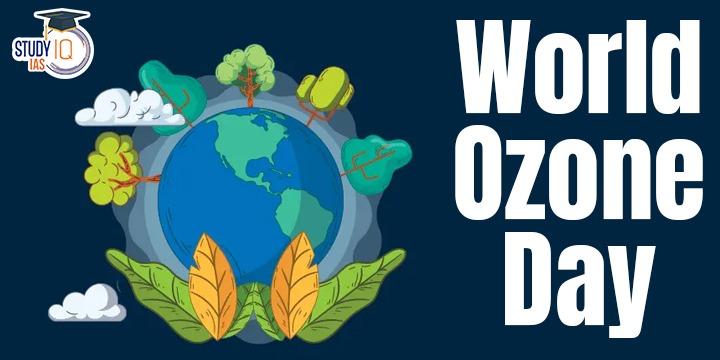Table of Contents
World Ozone Day
- United Nations General Assembly proclaimed September 16 as the World Ozone Day in 1994 to mark the signing of the Montreal Protocol.
- Theme: World Ozone Day theme for this year is Montreal Protocol@35: global cooperation protecting life on earth.
- Significance: The World Ozone Day event spreads awareness about the dangers of a depleting ozone layer and promotes innovations on how to better protect the ozone layer.

World Ozone Layer
- World Ozone Layer is a part of the Earth’s atmosphere that is responsible for absorbing the bulk of the Sun’s UV radiation.
- Degradation of World Ozone Layer :
- Ozone is an inorganic compound with the chemical formula O₃. It can be found in Earth’s upper atmosphere (the stratosphere) and lower atmosphere (the troposphere).
- Stratospheric ozone is naturally formed through the interaction of solar ultraviolet (UV) radiation with molecular oxygen (O2).
- The steady degradation of World Ozone Layer was first observed in the 1970s, when the thickness of ozone layer was reducing and dangerously getting depleted.
- Ozone depletion occurred significantly over the South Pole, which was called the ozone hole.
- Reasons: The main reason for the depletion was the use of chemicals like hydrochlorofluorocarbons (HCFCs), chlorofluorocarbons (CFCs), and halons.
- Effects of Ozone Layer Degradation:
- Affects life on Earth: All living organisms on Earth will be exposed to harmful ultraviolet radiation of the sun due to the depletion of the ozone.
- It can cause skin diseases, cancer, sunburns, fast ageing, cataract etc.
- Climate change: Ultraviolet rays will have a role in global warming. There will be faster melting of glacial ice.
- Increased incidents of heatwaves can occur.
- Preventing Ozone Layer Depletion:
- The Montreal Protocol on Substances that Deplete the World Ozone Layer was signed by countries in 1987.
- The protocol limited use of HCFCs, CFCs, halons and other substances that deplete the ozone layer.
Montreal Protocol is Related To
- The Montreal Protocol is a global agreement Montreal Protocol is related to aims to protect the ozone layer by phasing out the production and consumption of ozone-depleting substances (ODS).
- Ratification: The treaty was ratified by all countries in the United Nations, making it the first universally ratified treaty in the history of the UN.
- Targeted compounds: Majority of ozone depleting substances controlled by the Montreal Protocol contain either chlorine or bromine.
- Some ozone-depleting substances (ODSs) are not covered under the Montreal Protocol, including nitrous oxide (N2O).
- Timeframe: The treaty provides a timeline on which the production of those substances must be reduced and eventually eliminated. A 10-year phase-in for developing countries was also introduced.
- Multilateral fund: The Multilateral Fund for the Implementation of the Montreal Protocol was established in 1991 to provide financial and technical assistance to developing countries (having annual per capita consumption and production of ODS less than 0.3 kg) to comply with the control measures of the Protocol.

Montreal Amendment
- Under the amendment, developed countries will reduce their consumption of HCFCs and will completely phase them out by 2020.
- Developing countries will start their phase out process in 2013 and will target complete phase-out of HCFCs by 2030.
Kigali Amendment to the Montreal Protocol
- Parties to Montreal Protocol agreed to add HFCs to the list of controlled substances, and approved a plan for their gradual reduction by 80-85 per cent by the late 2040s.
- Developed countries will start reductions in 2019. Developing countries will freeze use of HFCs consumption levels in 2024 and in 2028 for some nations.
























 WhatsApp
WhatsApp